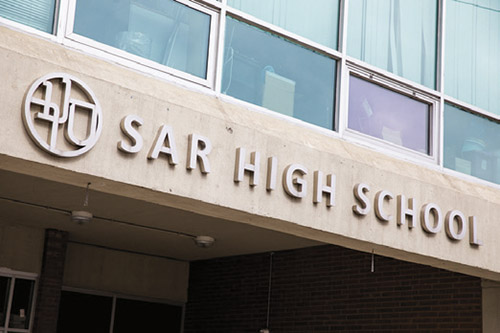




March 3 marked the one-year anniversary of SAR’s COVID closure. The entire SAR Academy marked the day with a brief program with special guests Adina and Lawrence Garbuz. “People asked me if today is a happy day or a sad day. That is a hard question. March 2 was the last day last year that we were in school together, then things changed for all of us over the next weeks and months,” reflected SAR Principal Rabbi Krauss.
Krauss relayed that the week’s Parshat Ki Tisa’s commandment of counting specifies that the counting won’t lead to a plague. Krauss stated, “You count things that matter. Every person counts, and everybody makes a difference. We did lots of counting (positivity rates, cases, deaths). We keep in mind in our tefillot those whose families were broken and those waiting for refuah sheleima. Today’s a day of hakarat hatov.”
Describing March 3, 2020, Krauss shared that Adina Garbuz contacted him at 6:30 a.m. “That started a complicated day. We were inspired by Adina and Lawrence, who are here today, especially in the first days and weeks of this challenge.” Citing a Wall Street Journal interview with the Garbuz family, Krauss recalled, “Adina suggested a very simple thing: Call someone up or drop a line. Say you’re thinking of them. When you do that, you make a difference in someone’s life.”
Lawrence Garbuz offered this message: “A year ago, I was diagnosed with COVID. I was the first positive test in the NYC area. Because of my diagnosis, a string of events took place, which affected the way we work and learn, and the way we are able to interact with each other.” Garbuz continued, “I am very blessed to be part of the SAR community. When I got sick, we were part of a larger community that sprang into action to care for one another. We certainly felt the love from SAR. I want to thank all of you who davened for us, who learned for us, who acted with kindness with each other and who conducted themselves in a menschlicht way.”
Garbuz added, “I’ve been asked many times this week for my thoughts, a year into it. In large part, thanks to my wife, and doctors who were very astute in their diagnosis, I’m here today and able to have this conversation. I have tried to use the last year to reflect and understand better what has happened to us and our community. It is bittersweet, though. We’ve lost people that we know, our friends and family. COVID-19 does not discriminate. Frum communities, the New Rochelle community and all communities have been hit particularly hard. You need to have a positive attitude to deal with each other and yourself, take care of yourself, enjoy life, slow down to take care of those things that are most important like homework, friendship and family.”
Seventh grader Jordana reflected on her COVID experience. Her bat mitzvah had been scheduled for March 9, 2020, with her reading Megillat Esther. As one of the first to have a Zoom bat mitzvah, she described it as “really strange, but great.” Jordana detailed how her dad had to purchase Zoom-specific supplies for the bat mitzvah, including a new TV, a backdrop and a microphone. The caterer re-packaged the prepared food to deliver to SAR staff in quarantine.
Fifth grade teacher Gail Krasner explained to the students, “Ask your grandparents. They’ll probably tell you exactly where they were when Neil Armstrong became the first astronaut to walk on the moon. Your parents can tell you where they were on 9/11, because those were important dates in history.” Krasner added, “Each of you can remember where you were one year ago today, and you’ll be able to, God willing, tell your children and grandchildren what we’re living through.”
Krasner described an unread book on her bookshelf called Pandemic 1918. “After a few months, I decided to learn about the last pandemic, about 100 years ago, called the Spanish Flu. What I learned is how different this pandemic is from the last one. One hundred years ago, doctors and scientists tried their best but couldn’t find good medicines to treat people. In 2020, it took less than a year to make the vaccine. In science, that is like a race car speeding around a track. Scientists think this vaccine will help them make other vaccines for other illnesses.”
Beginning in June until the recent snowstorms, the Krasners had hosted YINR Shabbat minyans in their backyard, for people who were uncomfortable davening indoors.
Closing the event, after David Glaser, music director, sang Acheinu Kol Beit Israel, and Rabbi Krauss explained that “we can think not only of Beit Israel, but Kol HaOlam, our brothers and sisters across the world still living with this challenge. “











